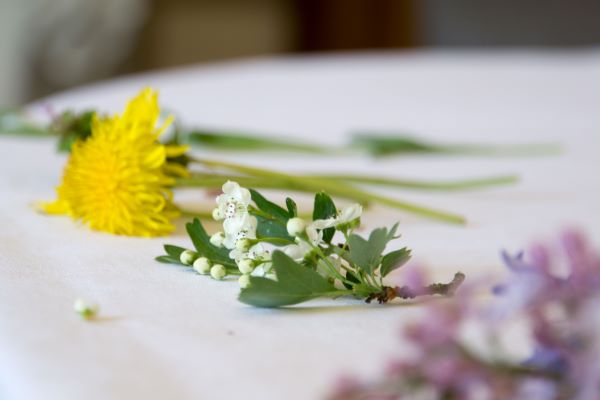I’ve always heard while working in the perfume industry that the incidence of brain-degenerative diseases among perfumers is fairly low. Given the amount of effort our brain expends during smelling, it seemed reasonable that this activity helps to stave off the processes that ultimately lead to dementia. However, a number of recent clinical studies reveal that this is not merely anecdotal evidence and that there is a link between improving our sense of smell with training and reducing the risk of Alzheimer’s disease.

In their article Bolstering our sense of smell may reduce the risk of dementia, The Guardian shares these findings. First, it’s important to note that a deterioration in one’s sense of smell is an early sign of Alzheimer’s and other dementia conditions. While the decline happens gradually, when it sets in and becomes obvious, it’s too late to address it. Which is why monitoring your ability to smell should be part of your constant health routine, the way we address our vision and hearing.
Two studies mentioned in the article caught my attention. One study led by Prof Thomas Hummel, of Technische Universität Dresden and published as Olfactory training with older people, indicated that smell training can improve verbal functions and subjective wellbeing. The results are encouraging, “Analyses show a significant improvement of olfactory function for participants in the OT group and improved verbal function and subjective well-being. In addition, results indicated a decrease of depressive symptoms.”
Another interesting study by researchers in Korea revealed that intensive olfactory training alleviates depression and improves some cognitive functions in patients with dementia, namely better attention, memory and language functions. “These results suggest that IOT may be an effective non-pharmacological approach for improving the symptoms of dementia,” the researchers comment.
The olfactory training in the Korean study involved smelling 40 different odors twice a day for 15 days. A similar training exercise was done by the German patients. It’s curious to note that the control group in the German study completed a daily Sudoku problem, but the positive results were observed in the group that practiced olfactory training.
My takeaway from these fascinating articles is that we must devote more time to smelling. The Scent Diary technique that I already introduced to you is an important part of my daily routine. I may not always write down my observations, but whenever I smell something, I form its description and shape in my head. This kind of conscious smelling is intensive and exciting, because it makes you more aware of aromas and their nuances. When practiced on a regular basis, it improves your sense of smell.
On Bois de Jasmin, you will find a number of other smelling exercises that will help you sharpen your sense of smell. During my Perfume Classes, I will likewise teach you various exercises, professional techniques and approaches to bolster your sense of smell. The most important thing is that these activities are fun, while also being good for your physical and mental health.
Extra Reading:
Photography by Bois de Jasmin













22 Comments
Claire M: Fascinating! I now feel even better about my hobby. January 8, 2024 at 11:52am
Victoria: It is, isn’t it! January 9, 2024 at 11:22am
Emily: Excited to dig through these articles, thank you.
Anecdotally, the Cleveland Clinic smell exercise protocols I did for months in 2021, to aid in recovery from COVID anosmia, sparked an interest in neuroplasticity that has now led to studying psychedelic therapy.
Most fascinating, in order to smell again I had to grow new neurons with new associations. Scents are somewhat different now.
Brains are so neat. January 8, 2024 at 11:53am
Emily Rawlings: For those curious, the smell exercises are described here:
https://consultqd.clevelandclinic.org/treating-smell-loss-in-covid-19-patients/ January 8, 2024 at 3:36pm
Victoria: Thank you. January 9, 2024 at 11:24am
Victoria: Exactly, brains adapt more easily than previously thought. January 9, 2024 at 11:22am
Julia: I love this. I am really going to try your exercises. I did go ahead and get the perfumery notes kit you recommended and I am excited to delve in. Your article, “Putting Scents into Words”, is great! I have a whole lot of samples of perfumes I need to try and the lemon and orange smell test is going to be interesting. Thank you! Julia January 8, 2024 at 12:32pm
Victoria: Which kit did you get? January 9, 2024 at 11:26am
Julia: I got the Perfumers Apprentice complete perfumery notes kit. It’s incredible! I have always wanted to get one and it is well worth it. I also ordered some extras. It came with tester strips, a booklet, pipettes and extra little glass bottles. I was really impressed with it. Thank you for recommending this Victoria! Julia January 9, 2024 at 11:41pm
Victoria: That’s an amazing kit! I wish there was something like this available for the EU market, since I wanted to recommend it to my students here. January 10, 2024 at 3:49am
Julia: It looks like they ship international, but then you most likely have high shipping and customs stuff to deal with? It’s funny, I would think the EU would have more options than the US. January 10, 2024 at 1:20pm
Jenni: Thank you. 🙂 January 8, 2024 at 2:02pm
Victoria: You are welcome! January 9, 2024 at 11:24am
Aurora: Thank you so much Victoria for giving us a wealth of information, it’s good to see scientists focusing on the often neglected sense of smell. January 8, 2024 at 2:04pm
Victoria: I think so too! January 9, 2024 at 11:25am
Christina: This is an important and interesting link to highlight, thank you. My mother is in the early stages of dementia and struggling to regain her sense of smell after getting COVID. Now, given your point about loss of smell also being a symptom of dementia, I am realizing there may be more than a virus at play.
Like Emily, I used olfactory exercises to recover my own sense of smell after getting COVID and found it very helpful. I encouraged my mom to do the same a few weeks ago, and now there is all the more reason to urge her to keep at it. January 8, 2024 at 11:06pm
Victoria: Anosmia is an important early sign of brain-degenerative conditions, so it’s important to address it. In some cases, it can even be reversed, which is a fascinating finding. January 9, 2024 at 11:26am
Christina: That is fascinating. Thank you! January 9, 2024 at 9:33pm
Ewan: There was a young lady called Vikki
Who found that smells could be tricky
So she studied perfume
Which lifted the gloom
Of that studious young lady called Vikki. January 9, 2024 at 12:58am
Victoria: Ha ha January 9, 2024 at 11:25am
Potimarron: Coincidentally, I read an article on the Barking up the Wrong Tree blog about keeping your brain sharp recently. The main takeaways were that it’s good to keep challenging yourself, maintain your relationships and look after your cardiovascular system (what’s good for the heart is good for the brain). I can see how the smelling exercises would be good for this (carrying on building connections,). I suspect with the perfumer example, there may be some confounding factors: my guess is that you have to keep talking to people as a perfumer, and that very few perfumers smoke (and we all know how bad smoking is for your cardiovascular system).
But let’s keep smelling new things and learning new things: life’s more interesting that way as well! January 9, 2024 at 11:53am
Victoria: I can’t agree with you more! January 10, 2024 at 3:48am